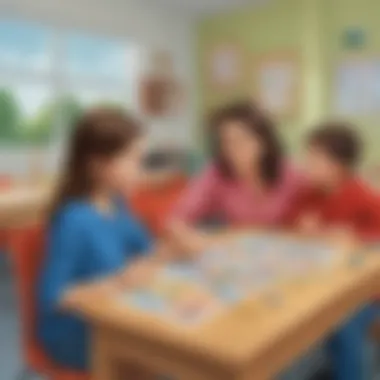Word Games for the Brain: Boosting Cognitive Skills


Intro
Word games have found their place in educational settings and homes alike as powerful tools for cognitive development among children. These games engage young minds, harnessing the fundamental aspects of language, critical thinking, and creativity. This article intends to delve into the significance of word games for children, showcasing the diverse types available, their varied benefits, and the practical ways they can be incorporated into learning strategies. In a rapidly changing world, the cultivation of cognitive skills is paramount, and word games serve as a valuable methodology for nurturing these skills.
Creative Activities
Engaging children in creative activities that revolve around word games can positively influence their cognitive development. Through hands-on experiences, children learn to explore and express their ideas, leading to enhanced language skills and critical thinking abilities.
Craft Ideas
Crafting activities centered on word games can be both fun and educational. For instance, children can create their own word search puzzles using colorful materials like paper, markers, and stickers. Additionally, assembling alphabet collages can stimulate their understanding of letters and words.
Step-by-Step Guides
- Word Search Puzzle:
- Alphabet Collage:
- Gather materials: paper, pencil, and ruler.
- Draw a grid and fill it with letters.
- Select words related to a specific theme (like animals or food).
- Hide these words in the grid and let children find them.
- Collect magazines or printouts of items that start with different letters.
- Cut out pictures and paste them corresponding to the letters on a large sheet.
- Discuss with children the words represented in their collage.
Educational Value
These creative undertakings not only develop fine motor skills but also deepen children's engagement with language. They foster an environment where learning becomes synonymous with play, making the cognitive development process an enjoyable endeavor.
Fun Quizzes
Incorporating quizzes into word games brings about a stimulating environment for enhancing knowledge retention. Quizzes can be simple and interactive, making the learning process enjoyable.
Quiz Topics
Quizzes can cover various topics, such as:
- Vocabulary enrichment
- Spelling challenges
- Comprehension tasks
Question Types
The different types of questions can include:
- Multiple choice
- True or false
- Fill in the blanks
These variations maintain children's interest and promote active participation throughout the quizzes.
Knowledge Reinforcement
Through repeated exposure to quiz topics, children solidify their understanding and recall of essential language skills. This reinforcement not only aids memory but also encourages critical thinking as they analyze and engage with the questions presented.


Fact-Based Articles
Fact-based articles can serve as excellent resources in conjunction with word games, providing children with relatable and informative content.
Topics
A range of diverse topics can be covered in these articles, such as:
- The importance of vocabulary
- The evolution of language
- Famous writers and their contributions
Engaging Content
These articles should present information clearly and engagingly, making it easy for children to absorb the material. Incorporating visuals and relatable examples will help cater to different learning styles.
Intro to Word Games
Word games are more than just a pastime; they are transformative tools for enhancing cognitive skills. For children, playing these games can lead to significant language development and growth in critical thinking abilities. Learning through play is a fundamental concept in education, and word games fit perfectly into this framework. They engage young minds in a fun and rewarding manner, allowing them to explore language, improve vocabulary, and develop creativity.
Definition and Purpose
Word games are structured activities that involve the manipulation of words and letters. They can range from simple activities, like letter matching, to more complex formats such as crosswords and Scrabble. The primary purpose of these games is to foster cognitive development. Through interactions with words, children learn critical language skills, enhance their problem-solving abilities, and engage in creative thinking.
The purpose is not just to entertain; word games challenge players to think logically and strategically. They promote active learning, where players become engaged in the game while simultaneously developing essential skills that will benefit them academically and socially.
Historical Overview
The origins of word games can be traced back centuries. Ancient civilizations have played various forms of language games, often for both entertainment and educational purposes. For example, word puzzle formats can be seen in the writings of ancient Greeks and Romans, who designed riddles and word plays to stimulate mental agility.
Through time, word games evolved into what we recognize today. In the 20th century, more structured forms such as Scrabble were developed, which popularized competitive word play. The appeal of these games crossed cultural and generational boundaries, allowing them to remain relevant in modern education. In today's age, word games are easily accessible through various mediums, including online platforms, apps, and printed books. They continue to thrive as effective instruments for cognitive enhancement in children.
Types of Word Games
Word games play a crucial role in cognitive development. They engage the mind, challenge problem-solving skills, and enhance language capabilities. This section elaborates on different types of word games. Each variant offers unique benefits and challenges, making them versatile tools for learning and growth. By exploring these varied games, educators and parents gain insights into how each can stimulate mental skills in children. This, in turn, fosters a love of language and deepens critical thinking abilities.
Crossword Puzzles
Crossword puzzles are classic word games that require players to fill in a grid with words based on clues. The beauty of crosswords lies in their capacity to enhance vocabulary and comprehension. Children not only learn new words but also develop their ability to think critically and make connections between concepts. Puzzles often challenge players to think laterally, encouraging them to approach problems from multiple angles. Furthermore, completing a crossword puzzle provides a sense of achievement, which can boost confidence.
Word Searches
Word searches involve finding specific words hidden in a grid of letters. They are simple yet effective for sharpening observational skills and promoting concentration. By locating words, children practice letter recognition while also engaging with vocabulary. This game often appeals to younger audiences as it requires less complex reasoning than other word games. That said, word searches can still offer cognitive stimulation. When designed with educational themes, they can reinforce learning in various subjects, from science to history.
Scrabble and Variations
Scrabble is a well-known board game that combines strategy and vocabulary. Players score points by forming words on a game board using letter tiles. This promotes not only word knowledge but also strategic thinking, as players need to consider placement for maximum scoring. Variations of Scrabble, such as Words with Friends, leverage technology for an interactive experience, extending gameplay beyond traditional settings. These games promote friendly competition, further encouraging engagement with language in a fun format.
Anagrams


Anagrams engage players by challenging them to rearrange letters to form new words. This game enhances cognitive flexibility, a key component of critical thinking. It requires players to think about the structure of words and their possible combinations. Children improve their spelling and pronunciation skills while enhancing their ability to spot patterns in letters. Moreover, anagrams can be adapted to various themes, making them a flexible tool for education.
Word Association Games
Word association games stimulate the brain by prompting participants to connect words based on their relevance or similarity. Such games cultivate quick thinking and creativity. Players learn to think on their feet and make connections, fostering collaboration and dialogue. In an educational environment, these games can encourage deeper discussions, promote teamwork, and diversify language use. For children, the social aspect of such games adds an engaging layer, making word learning more interactive.
“Engagement in word games cultivates essential cognitive skills, contributing to holistic educational experiences.”
Benefits of Word Games for Cognitive Development
Word games play a vital role in the cognitive development of children. These games offer a practical way to enhance various mental faculties. They not only support language skills but also promote memory retention, critical thinking, and creativity. Understanding these benefits can help parents and educators utilize word games effectively.
Language Proficiency
Language proficiency is among the most significant benefits of engaging with word games. When children participate in games that focus on word manipulation or vocabulary enhancement, they are actively practicing their language skills. For example, games like Scrabble require players to think of words that fit given letters. This practice directly impacts a child's vocabulary and spelling ability.
Moreover, children learn context by seeing how words interact in sentences. They become familiar with synonyms and antonyms, thus enriching their linguistic understanding. As they play, it is important for guardians to encourage discussions about word meanings. This will deepen comprehension and help in retention.
Enhanced Memory
Memory enhancement is another key aspect of word games. Many of these games require players to remember words, their spellings, and the rules that govern their play. For instance, crossword puzzles not only demand recall of words but also challenge players to remember clues associated with them. This exercise strengthens short-term and long-term memory.
Additionally, players often form connections between words and concepts, which aids memory retention. When children link words to images or sounds, they build mental associations. This practice can improve memory skills well beyond the game, benefiting academic performance.
Critical Thinking Skills
Engaging in word games helps develop critical thinking skills among children. Many word games challenge players to solve problems or think strategically. For instance, figuring out how to place words in Scrabble or completing a crossword requires analysis and problem-solving skills. These games encourage children to evaluate options and make decisions, enhancing their cognitive abilities.
Critical thinking is essential for academic achievement and personal growth. Players not only learn to tackle challenges but also understand the process of trial and error. This is crucial as children grow and face more complex problems in school and life.
Creativity and Imagination
Creativity and imagination flourish in the environment created by word games. Children are often required to invent new words or find unusual combinations when playing anagram games. These activities stimulate their imagination by pushing them to think outside of conventional boundaries.
Involvement in such games encourages playful thinking and allows children to express themselves creatively. For parents and educators, it is valuable to promote imaginative wordplay that goes beyond structured games. Encouraging storytelling based on words or invented characters can further enhance creative skills.
Engaging with word games not only builds cognitive skills but also fosters a love for language and learning.
In summary, the cognitive benefits of word games extend far beyond mere entertainment. They serve as tools for significant language improvement, memory enhancement, and the development of critical thinking and creativity. Integrating these games into daily routines can contribute to holistic cognitive development in children.
Integrating Word Games into Learning
Integrating word games into learning environments has proven to be effective in fostering cognitive and language development in children. Word games not only are enjoyable but also create interactive experiences that enhance critical thinking and creativity. By incorporating these activities into educational settings, both teachers and parents can cultivate a richer learning experience that is both motivating and educational.
In the Classroom
Classrooms benefit immensely from incorporating word games directly into the curriculum. Teachers can use these games to engage students in a fun way that promotes language acquisition. For example, integrating crossword puzzles during language lessons encourages vocabulary building. It provides a context in which students can learn and apply new words.


Another effective method would be organizing spelling bees or word association games. These activities spark friendly competition among students. This not only enhances their learning experience but helps to build social skills as well. Word games can also facilitate group discussions, enabling collaborative learning where students can share ideas and strategies.
At Home
Parents can extend the benefits of word games beyond the classroom into the home. Playing games like Scrabble with family members can turn an ordinary evening into an enriching learning opportunity. This interaction allows children to practice their spelling and vocabulary in a relaxed setting, which makes the learning process feel effortless.
Additionally, parents can create custom word searches tailored to their children's interests. This personal touch fuels motivation. When children see their interests reflected in their learning activities, their engagement tends to increase significantly. Encouraging word games at home fosters a love for language and builds a foundation for lifelong learning.
Using Technology
In the digital age, technology presents countless avenues to incorporate word games into learning. There are several mobile applications and online platforms dedicated exclusively to word games, such as Words with Friends or Wordscapes. These apps make it easy for children to play anytime and anywhere. Moreover, they can connect with peers and family members online, fostering collaboration.
Using educational software that emphasizes word game-based learning can make it even more powerful. Many programs offer various levels tailored to different age groups, ensuring that learning is appropriate and challenging. Integrating word games through technology can lead to a more dynamic educational experience where children can learn while having fun.
Ultimately, integrating word games into learning provides a well-rounded approach to education. This encourages academic growth while promoting essential cognitive skills in an enjoyable manner.
Challenges and Limitations
Word games are valuable tools for enhancing cognitive skills, but certain challenges can impede their effectiveness. Understanding these limitations is crucial for parents and educators who wish to leverage these games for educational growth. Identifying obstacles allows for a more tailored approach to game selection and implementation in learning environments.
Potential Frustration
One notable challenge with word games is the potential for frustration among children. Some games can be complex and require a level of vocabulary or cognitive skill that might be too advanced for young players. This dissonance between a child's abilities and game demands can lead to discouragement. If a child finds a game too difficult, they may lose interest and avoid similar activities in the future. Therefore, selecting age-appropriate games and gradually introducing more challenging options is critical.
Considering the child's current skill level is essential in this regard. Offering supportive feedback and celebrating small achievements can help children navigate challenges in word games. It is also advisable to engage them in discussions about strategies for improving their skills. A supportive environment fosters perseverance and encourages healthy cognitive development.
Accessibility Issues
Accessibility is another significant concern regarding word games. Not all children have equal access to resources, whether it's due to socioeconomic factors or disabilities. Some children may lack access to physical games or digital platforms. Others may face difficulties related to visual or learning disabilities, limiting their ability to fully engage with certain word games.
To address these accessibility issues, parents and educators can explore various adaptations. This may include utilizing large print materials for visually impaired children or incorporating audio support for those with reading difficulties. Online resources can also be leveraged, as many educational websites offer free or low-cost word game options that are designed to be inclusive.
Ultimately, ensuring that all children can participate in word games will enhance their learning experiences and cognitive skills. Recognizing and addressing these challenges allows for a more effective use of word games in education. By being proactive, educators and parents can harness the full potential of word games, making them beneficial tools for every child.
Finale
In exploring the world of word games, we have uncovered their profound potential in enhancing cognitive skills. The significance of this topic lies in its multifaceted benefits for elementary school children. Word games engage young minds, sharpening language proficiency, and critical thinking, while fostering creativity. By integrating these games into learning contexts, caregivers and educators can create enriched environments for cognitive growth.
Recap of Key Points
Throughout the article, key themes have emerged around the impact of word games on cognitive development. These include:
- Variety of Games: Different games cater to various skills, such as crossword puzzles, anagrams, and Scrabble.
- Cognitive Benefits: Word games enhance memory, critical thinking, and language skills, promoting holistic development.
- Integration: We discussed methods of incorporating word games in classrooms and at home, ensuring accessibility for all children.
- Challenges: Understanding potential frustrations and accessibility issues is crucial for effective implementation.
In summary, word games stand as powerful tools for cognitive enhancement, encouraging children to think critically and creatively.
Encouraging Lifelong Learning
The conclusion also emphasizes the importance of fostering a culture of lifelong learning through word games. Engaging children in these activities not only benefits them during childhood but lays a foundation for future learning. They develop a love for words and language, which extends beyond the classroom.
It is essential for parents, educators, and caregivers to encourage exploration and play with words. This can be achieved by:
- Creating Opportunities: Introduce word games during family time or in educational settings.
- Promoting Challenge: Encourage children to take on new levels or types of games to continually stimulate their minds.
- Celebrating Small Wins: Acknowledge progress and achievements, no matter how small, to motivate continued engagement.







